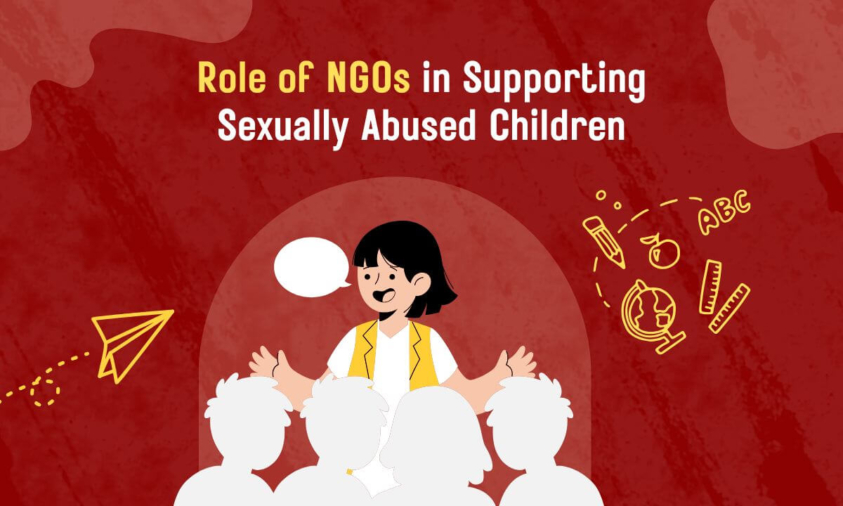“There can be no keener revelation of a society’s soul than the way in which it treats its children.”
— Nelson Mandela
Sexual abuse of children is one of the most traumatic violations of human rights. In India, while legislation like the POCSO Act lays down a robust legal framework for the protection of minors, it is often the Non-Governmental Organizations (NGOs) that provide the human touch—the day-to-day, ground-level support that helps survivors reclaim their lives.
From emergency response to long-term rehabilitation, NGOs are often the invisible force behind successful child protection efforts. This blog explores the multifaceted roles these organizations play in supporting survivors of child sexual abuse.
- Creating Safe Access Points for Help: For many abused children, approaching a police station or authority is not always safe or possible. NGOs provide alternative, approachable spaces—both online and offline—where children or concerned adults can report abuse. Through school programs, community centers, and helplines like Childline 1098, NGOs offer non-intimidating first contact points. They also often conduct awareness campaigns that educate children on body autonomy, safe/unsafe touch, and how to seek help, especially in rural and underserved areas.
- Providing Immediate Crisis Intervention: Once a case is reported, time is critical. NGOs:
- Coordinate with local police and Child Welfare Committees (CWCs).
- Offer emergency medical care and counseling.
- Ensure safe housing through shelter homes or partner institutions for children in danger.
Organizations like Save the Children India work in collaboration with law enforcement and government bodies to ensure immediate safety and medical support, especially in remote areas.
- Emotional and Psychological Rehabilitation: Healing from sexual abuse goes beyond physical recovery. NGOs employ child psychologists, social workers, and therapists to help children process their trauma through:
- Play therapy and art therapy for non-verbal expression.
- Trauma-informed counseling sessions customized to each child’s needs.
- Parental counseling, where reintegration into the family is appropriate.
For instance, RAHI Foundation specializes in counseling for survivors of incest and sexual abuse, creating safe, long-term healing environments.
- Legal Literacy and Courtroom Assistance: The legal journey under POCSO can be long and confusing for children. NGOs play a vital role by:
- Appointing support persons as per POCSO guidelines to assist throughout the trial.
- Helping families understand legal rights and obligations.
- Connecting them to free legal aid or representing them through their own legal teams.
Organizations such as Aarambh India have created simplified child protection toolkits and guides to help both survivors and caregivers navigate legal systems effectively.
- Long-Term Rehabilitation and Education: Survivors of child sexual abuse often drop out of school or face stigma that hinders their education and self-esteem. NGOs help restore normalcy by:
- Reintegrating children into mainstream or alternative schools.
- Providing scholarships and vocational training.
- Running life skills programs to build confidence, independence, and safety awareness.
Programs like Bal Sakha in Bihar provide both education and shelter to boys affected by abuse, often overlooked in gendered narratives.
- Advocacy and Systemic Reform: Beyond individual cases, NGOs play a key role in shaping child protection policy in India. Through their research and advocacy:
- They highlight gaps in implementation of POCSO and Juvenile Justice laws.
- Push for better training of police, judges, and support staff.
- Demand child-friendly courtrooms and procedures across the country.
Many such organizations participate in policy formulation with the National Commission for Protection of Child Rights (NCPCR), ensuring children’s voices are represented in legal reforms.
- Digital Safety and Online Abuse Prevention: In an increasingly digital world, NGOs are at the forefront of protecting children from cyber grooming, sextortion, and online exploitation. They:
- Conduct digital literacy workshops for students and parents.
- Work with law enforcement to report and remove abusive content.
- Support survivors of online abuse with both legal and emotional aid.
For instance, Cyber Peace Foundation collaborates with schools and tech companies to promote cyber safety awareness among adolescents.
Final Thoughts
NGOs in India are not just service providers; they are lifelines for children who have endured the unthinkable. They work tirelessly in courts, classrooms, villages, and homes—often with limited resources but limitless empathy. Without their presence, the promise of child protection laws would remain just that, a promise.
To truly end child sexual abuse, the work of these organizations must be amplified, supported, and integrated into national policy and public consciousness.
In case you are looking for customized child safety training, POCSO-related training, or POCSO advisory services, please feel free to reach out to us at +919004521614 or [email protected].
Authored by Tanvi Ojha, Content Writer Intern


 Cart is empty
Cart is empty 
